Renault Express vs Toyota Proace City – Differences & prices compared
Everyday use, family trips or long-distance drives – here’s where the differences show.
Discover whether Renault Express or Toyota Proace City fits your lifestyle better.
Costs and Efficiency:
Price and efficiency are often the first things buyers look at. Here it becomes clear which model has the long-term edge – whether at the pump, the plug, or in purchase price.
Renault Express has a distinct advantage in terms of price – it starts at 17100 £, while the Toyota Proace City costs 20800 £. That’s a price difference of around 3673 £.
Fuel consumption also shows a difference: Renault Express manages with 4.60 L and is therefore to a small extent more efficient than the Toyota Proace City with 5.30 L. The difference is about 0.70 L per 100 km.
Engine and Performance:
Power, torque and acceleration say a lot about how a car feels on the road. This is where you see which model delivers more driving dynamics.
When it comes to engine power, the Toyota Proace City has a clearly perceptible edge – offering 136 HP compared to 102 HP. That’s roughly 34 HP more horsepower.
In acceleration from 0 to 100 km/h, the Toyota Proace City is hardly perceptible quicker – completing the sprint in 11.50 s, while the Renault Express takes 11.90 s. That’s about 0.40 s faster.
In terms of top speed, the Toyota Proace City performs slightly better – reaching 186 km/h, while the Renault Express tops out at 167 km/h. The difference is around 19 km/h.
There’s also a difference in torque: Toyota Proace City pulls to a small extent stronger with 300 Nm compared to 240 Nm. That’s about 60 Nm difference.
Space and Everyday Use:
Cabin size, boot volume and payload all play a role in everyday practicality. Here, comfort and flexibility make the difference.
Seats: Toyota Proace City offers significantly more seating capacity – 7 vs 2.
In curb weight, Renault Express is minimal lighter – 1296 kg compared to 1366 kg. The difference is around 70 kg.
In maximum load capacity, the Renault Express performs to a small extent better – up to 3300 L, which is about 607 L more than the Toyota Proace City.
When it comes to payload, Toyota Proace City a bit takes the win – 869 kg compared to 700 kg. That’s a difference of about 169 kg.
Who wins the race?
The Toyota Proace City proves to be outperforms in nearly all aspects and therefore becomes our DriveDuel Champion!
Toyota Proace City is the better all-rounder in this comparison.
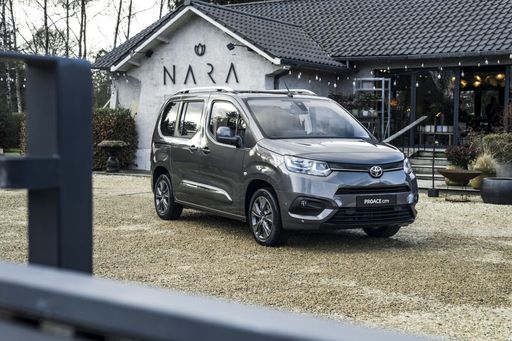 @ Toyota Motor Corporation
@ Toyota Motor Corporation
Toyota Proace City
Renault Express
The Renault Express brings a fresh design to the van segment, combining practicality with modern styling cues. Its spacious interior and clever storage solutions make it an ideal choice for both business and leisure purposes. With a focus on comfort and functionality, this vehicle stands out as a versatile option for those in need of reliable transportation.
detailsToyota Proace City
The Toyota Proace City High Roof Combi is designed to seamlessly blend practicality with comfort, making it an ideal choice for families and businesses alike. Its versatile interior allows for flexible seating and cargo arrangements, catering to a variety of transport needs. Equipped with modern technology and advanced safety features, this vehicle ensures a reliable and secure driving experience.
details @ Toyota Motor Corporation
@ Toyota Motor Corporation
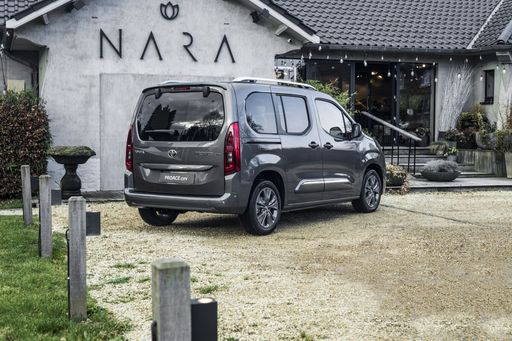 @ Toyota Motor Corporation
@ Toyota Motor Corporation
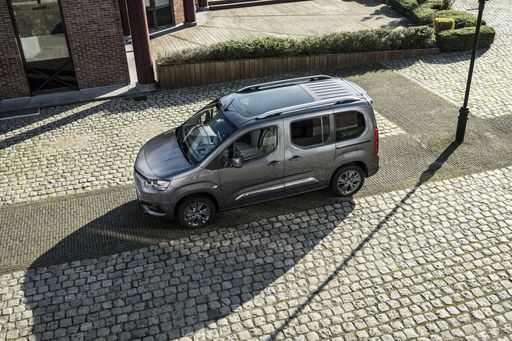 @ Toyota Motor Corporation
@ Toyota Motor Corporation
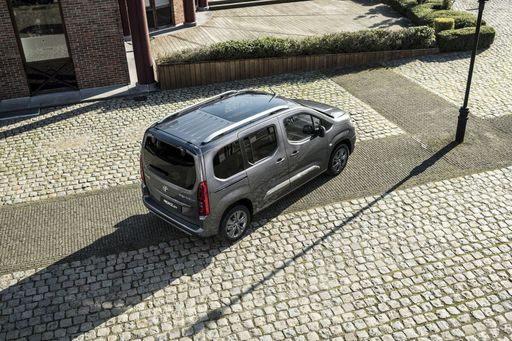 @ Toyota Motor Corporation
@ Toyota Motor Corporation
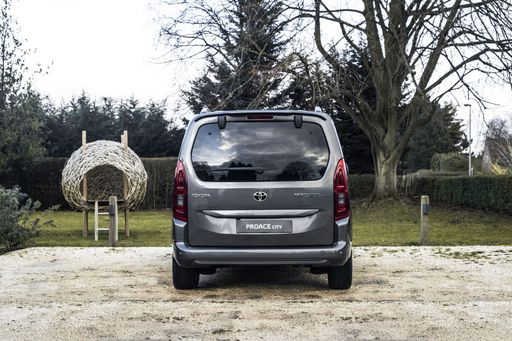 @ Toyota Motor Corporation
@ Toyota Motor Corporation
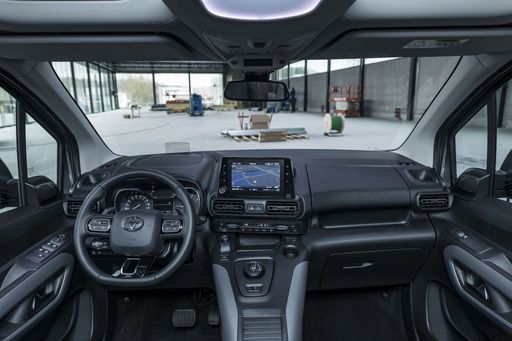 @ Toyota Motor Corporation
@ Toyota Motor Corporation
 @ Toyota Motor Corporation
@ Toyota Motor Corporation
|
|
|
|
|
Costs and Consumption |
|
|---|---|
|
Price
17100 - 19500 £
|
Price
20800 - 44100 £
|
|
Consumption L/100km
4.6 - 6.6 L
|
Consumption L/100km
5.3 - 6.3 L
|
|
Consumption kWh/100km
-
|
Consumption kWh/100km
18.10 kWh
|
|
Electric Range
-
|
Electric Range
343 km
|
|
Battery Capacity
-
|
Battery Capacity
-
|
|
co2
121 - 149 g/km
|
co2
0 - 146 g/km
|
|
Fuel tank capacity
50 L
|
Fuel tank capacity
50 - 61 L
|
Dimensions and Body |
|
|---|---|
|
Body Type
Cargo Van
|
Body Type
High Roof Estate
|
|
Seats
2
|
Seats
5 - 7
|
|
Doors
4
|
Doors
4 - 5
|
|
Curb weight
1296 - 1390 kg
|
Curb weight
1366 - 1664 kg
|
|
Trunk capacity
-
|
Trunk capacity
322 - 912 L
|
|
Length
4393 mm
|
Length
4401 - 4751 mm
|
|
Width
1775 mm
|
Width
1848 mm
|
|
Height
1811 mm
|
Height
1812 - 1818 mm
|
|
Max trunk capacity
3300 L
|
Max trunk capacity
2126 - 2693 L
|
|
Payload
575 - 700 kg
|
Payload
525 - 869 kg
|
Engine and Performance |
|
|---|---|
|
Engine Type
Diesel, Petrol
|
Engine Type
Petrol, Diesel, Electric
|
|
Transmission
Manuel
|
Transmission
Manuel, Automatic
|
|
Transmission Detail
Manual Gearbox
|
Transmission Detail
Manual Gearbox, Reduction Gearbox, Automatic Gearbox
|
|
Drive Type
Front-Wheel Drive
|
Drive Type
Front-Wheel Drive
|
|
Power HP
75 - 102 HP
|
Power HP
102 - 136 HP
|
|
Acceleration 0-100km/h
11.9 - 16.3 s
|
Acceleration 0-100km/h
11.5 - 13.2 s
|
|
Max Speed
100 - 167 km/h
|
Max Speed
135 - 186 km/h
|
|
Torque
200 - 240 Nm
|
Torque
205 - 300 Nm
|
|
Number of Cylinders
4
|
Number of Cylinders
3 - 4
|
|
Power kW
55 - 75 kW
|
Power kW
75 - 100 kW
|
|
Engine capacity
1332 - 1461 cm3
|
Engine capacity
1199 - 1499 cm3
|
General |
|
|---|---|
|
Model Year
2021
|
Model Year
2024 - 2025
|
|
CO2 Efficiency Class
D, E
|
CO2 Efficiency Class
E, A
|
|
Brand
Renault
|
Brand
Toyota
|
Is the Renault Express offered with different drivetrains?
The Renault Express is offered with Front-Wheel Drive.
The prices and data displayed are estimates based on German list prices and may vary by country. This information is not legally binding.
